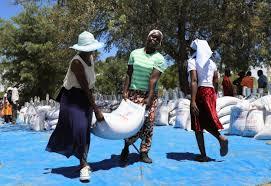IMF praises economic reforms but can’t lend due to arrears

#1: IMF lauds Zimbabwe’s economic progress while arrears block lending:
📌 Key Points
-
The International Monetary Fund (IMF) has acknowledged that Zimbabwe has recently taken positive steps on the economic front — including limiting central bank financing of the government and working to stabilize the exchange rate. Reuters
-
However, the IMF is currently unable to provide direct lending support because Zimbabwe has outstanding arrears estimated at around US$12.2 billion, owed to multilateral and bilateral creditors (such as the African Development Bank and the World Bank). Reuters
-
As a workaround, the IMF is engaging Zimbabwe under a staff-monitored program (SMP), which is a looser form of engagement than a full loan program. The SMP can help build consensus and credibility around economic policy but does not require formal approval from the IMF’s Executive Board. Reuters
-
Zimbabwe has expressed the ambition to secure US$2.6 billion in bridge financing by mid-2026, as part of its debt resolution plan. Reuters
-
An IMF mission is slated to visit Harare at the end of October 2025 to hammer out the details of the SMP and further engage with Zimbabwe’s authorities. Reuters
📊 Economic Context & Risks
-
In its 2025 Article IV consultation, the IMF noted that Zimbabwe’s economy is recovering — helped by better climate conditions, high gold prices, and strong remittance inflows. IMF+1
-
Zimbabwe’s growth is projected to rebound to about 6% in 2025, up from only about 1.7% in 2024. Reuters+2IMF+2
-
However, challenges remain. The IMF and analysts point to fiscal pressures, an accumulation of domestic arrears, low foreign exchange reserves, and the risk of reverting to monetary financing (i.e. printing money) if financing gaps aren’t managed. IMF+2Equity Axis+2
-
The ZiG (Zimbabwe Gold) currency, introduced in 2024, has shown some stabilization, but doubts persist about its long-term credibility and acceptance in the economy. Reuters+2IMF+2
If you like, I can break down how this affects ordinary Zimbabweans (prices, jobs, services) or focus on the debt restructuring / SMP plan in more detail. Would you prefer that?






